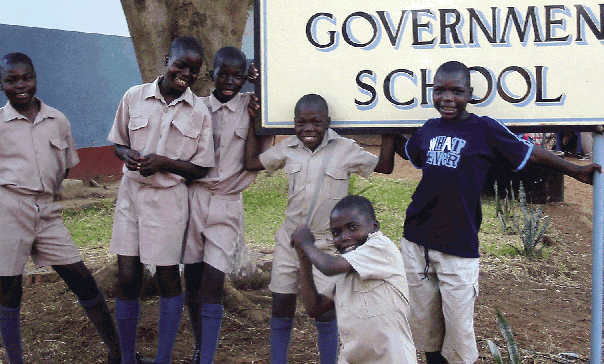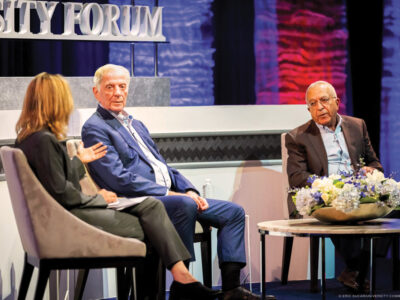
Class of ’01 | When Cam Winton C’01 heard the call last summer, he was walking by a park in Victoria Falls, Zimbabwe, intent on dinner. The voice came down from above.
“Sir,” it said in halting English, “can you buy us some food?”
He looked up and saw three young boys sitting in a tree. Another sat on the ground. Winton thought about it for a second, then conveyed to the boys that yes, he’d buy them dinner. They walked to a pizza place that catered to Western tourists, and he bought pizza and Coke for everyone. Then he sat back and pondered the situation.
“These were little boys, not teenagers, and as I sat there, I realized things weren’t quite right,” Winton recalls. “They had mud caked in their hair, their clothes were filthy and torn, and they were barefoot. I wondered why they were not at home with their own families eating dinner there.”
So he asked the waitress, whose name was Moreblessing Moyo and who spoke fluent English, what she knew about them. “Oh,” she told him, “these are street kids of Victoria Falls.”
He was unclear what that really meant. So she explained: Either their parents had died of AIDS, tuberculosis, or malaria, or the kids had been abandoned because of the terrible economic and political situation in Zimbabwe. Since there is no orphanage in Victoria Falls, and virtually no social-welfare system in Zimbabwe, the boys had resorted to sleeping in a cave at the edge of town, begging for food money or picking through garbage for scraps. Needless to say, they were not going to school, since even the public schools cost money. They were probably between the ages of 10 and 14—even the boys themselves weren’t sure.
It was “a kind of fork in the road” for Winton, who already had a pretty strong public-service ethic. After all, he was spending the summer in neighboring Botswana as a consultant to the government on a project to dispense AIDS medicines, having turned down an attractive offer to work in the federal prosecutor’s office in Washington, D.C. In a few weeks he would be returning for his second year at Georgetown Law School.
He asked the waitress how much school fees would cost for each kid. The answer: about $6 a year. It would cost another $60 a month to rent a house where all the boys could live. And then there was clothing, medical checkups, bedding, and so forth, and he would need to hire an adult couple to cook and provide supervision.
While they were talking, a man named Mike Mukozho, who worked in the building as a tourist agent, overheard them and joined the conversation; he appeared to have the insight and savvy to be helpful, and eventually offered to take on the role of adult supervisor, along with his wife, Felistas. For Winton, it was the proverbial blinding flash.
“It hit me like a thunderbolt—that I was in a unique position that I’d perhaps never be in again, to do something [positive] for real people,” he recalls. “But it was terrifying, because if I screwed up, I would regret it forever. So I didn’t want to screw it up.”
He told the four boys to meet him there the next day. They did—joined by two more boys. The six were Peter, Benjamin, Shelton, Mqondisi, Libanga, and Simbarashe (Benjamin since got into a fight and ran away, and is not likely to return). And thus was born the Victoria Falls Children’s Fund, also known as “Cam’s Kids.”
On returning to Botswana, Cam contacted his father, Randy Winton WG’76 (an investment adviser who lives in the Philadelphia suburb of Swarthmore), and told him what he was planning to do. He was willing to shoulder the costs himself for as long as he could, but since he calculated that the project would cost about $1,000 per boy every year until they had finished secondary school, he knew he would need some help. Through Randy, they enlisted the support of the Media (Pennsylvania) Rotary Club, and found that there was a Rotary Club in Victoria Falls. That conduit has been vital, since it enables Cam to have money deposited directly into the bank account of the Rotary Club, which can distribute it as necessary.
Mike and Moreblessing have handled all the logistics, and have proved reliable and honest. (“Trust,” says Cam, “has been key to the entire thing.”) They have also been able to handle certain delicate cultural matters—such as obtaining the blessings of long-dead ancestors—that would have been impossible for an American. There have been a few bumps in the road, but nothing they couldn’t handle. When Felistas quickly soured on cooking for five boys plus her two-year-old son, for example, Cam worked out an agreement wherein someone else would cook and Mike would pay part of the rent for the house.
In recent months, through public talks arranged by Randy, Cam raised $5,000, and their local church in Swarthmore was considering a proposal to provide financial support for a number of years.
On the whole, “it’s worked out great,” says Cam, now back at Georgetown Law. The boys have planted a vegetable garden in the backyard and have “settled into the routine of being kids”: going to school, coming home and doing their homework, eating—they now have three meals a day, plus snacks—and going to sleep in a real bed. Peter, the oldest, has graduated from primary school and is starting secondary school in January.
“My long-term goal is for each of the five boys to graduate from high school,” says Cam, noting that Peter probably has four more years of school ahead of him, while the youngest may have 10.
“That’s a sobering thought, to be honest,” he admits. “But there’s a great quote I heard, though there are competing schools of thought as to who said it: ‘Make no small plans, for they have no power to stir men’s blood.’”
—S.H.




